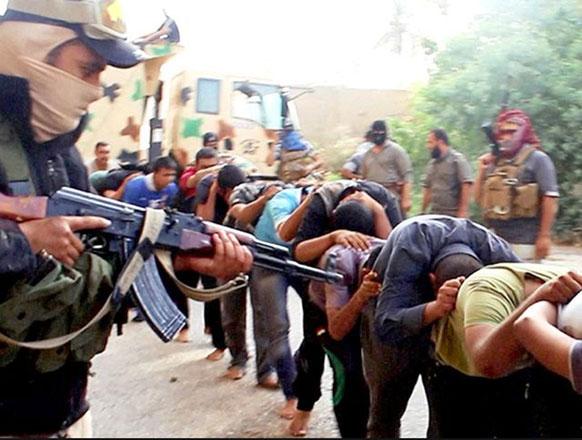You are here
Iraq hangs 36 over 2014 massacre of recruits
By AFP - Aug 21,2016 - Last updated at Aug 21,2016

This image posted online by Daesh militants on June 14, 2014 shows Iraqi cadets captured by Daesh militants moments before they were killed in Tikrit, Iraq. Iraqi officials say the country has executed 36 men on Sunday, convicted of taking part in the Daesh militants massacre of hundreds of soldiers in 2014 (AP photo)
NASIRIYAH, Iraq — Iraq on Sunday hanged 36 men convicted over the 2014 massacre by extremists and allied militants of up to 1,700 military recruits, officials said.
They had been found guilty of involvement in the "Speicher" massacre, named after a base near Tikrit where the recruits were kidnapped before being executed in a massacre claimed by the Daesh terror group.
"The executions of 36 convicted over the Speicher crime were carried out this morning in Nasiriyah Prison," a spokesman for the governor's office in Dhiqar, the province of which Nasiriyah is the capital, told AFP.
"The governor of Dhiqar, Yahya Al Nasseri and Justice Minister Haidar Al Zamili were present to oversee the executions," Abdelhassan Dawood said.
"They were transferred to Nasiriyah last week after the president approved the executions," he said, referring to the necessary green light from Fuad Masum.
Following the death of more than 300 people in the worst ever single bomb attack to strike Baghdad last month, Prime Minister Haider Al Abadi had said he wanted to expedite the execution of inmates sentenced to death in terrorism cases.
The Dhiqar governor confirmed to AFP that the executions were carried out by hanging.
His spokesman said that around 400 of the Speicher massacre victims were from the Dhiqar province, which is predominantly Shiite and located in Iraq's south.
"Tens of relatives attended the executions," said Dawood. "They shouted Allahu Akbar [God is greatest], they were happy to see those people dead."
Among them was Najla Shaab, a 30-year-old woman whose husband was killed in the massacre, leaving her to raise their children alone.
"Thank you God, it's a fair punishment for the worst crime, a triple crime of killing, throwing bodies in the river and burying people alive," she told AFP by phone.
Botched trials
One of the sites of the massacre was the former police building inside former president Saddam Hussein's palace complex in Tikrit.
Video footage subsequently released by Daesh showed an assembly-line massacre in which gunmen herded their victims towards the quay, shot them in the back of the head and pushed them in the water one after the other.
The trials that have led to Iraq’s latest batches of death sentences which have been severely criticised by rights groups as failing to meet basic standards.
Amnesty International had slammed Iraq’s systematic resort to the death penalty following the execution of 22 other people in May this year.
“The use of the death penalty is deplorable in all circumstances, and it is particularly horrendous when applied after grossly unfair trials marred by allegations of confessions extracted under torture as is frequently the case in Iraq,” the group’s Iraq researcher Diana Eltahawy said.
The United Nations had criticised Abadi’s call to speed up executions, which according to Amnesty already topped 100 for 2016 before Sunday’s hangings.
“Fast-tracking executions will only accelerate injustice,” UN High Commissioner for Human Rights HH Prince Zeid said earlier this month.
The Speicher massacre is considered one of Daesh’s worst crimes since it took over large parts of the country in 2014.
Combined with a call by the country’s top Shiite cleric Grand Ayatollah Ali Al Sistani for Iraqis to take up arms against them, the Speicher massacre played a key role in the mass recruitment of Shiite volunteers to fight the extremists.
Related Articles
BAGHDAD — Iraq has sentenced 14 people to death by hanging for their role in the Daesh terror group massacre of hundreds of army cadets in 2
BAGHDAD — An Iraqi court on Wednesday sentenced 24 men to hang over the June 2014 massacre by jihadists and allied militants of hundreds of
BAGHDAD — Iraq has exhumed the remains of 470 people believed to have been executed by jihadists near Tikrit last year in what is known as t















